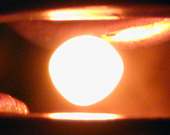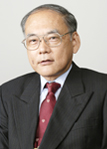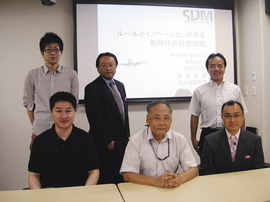Systems Engineering
Prof. Hibiya has been involved in the research and development of electronic and photonic crystal materials, and has been engaged in research on material processes under microgravity conditions in space. Scientific and technological experiments under microgravity conditions are conducted in airplanes in parabolic flight, in miniature rockets, and in space stations. Because experiments under microgravity conditions require the support of various stakeholders with different beliefs and decision-making methodologies, unlike normal scientific experiments which can be conducted in a closed laboratory, researchers must possess problem solving skills and the ability to understanding multiple viewpoints. Here are some of the laboratory’s recent research topics.
Thermophysical property measurement of high temperature melts in the European module in the International Space Station

Electromagnetic flotation of molten silicon

International Space Station
Study of thermophysical property measurement of materials such as melted metal and semiconductors using the equipment boarded in the European module in the International Space Station has been proposed as a 2011 joint research by Japan, Germany and Italy. Students are also involved in research on the optimization of measurement conditions in the microgravity conditions in an airplane in parabolic flight. Numerical fluid mechanics calculation is one of the most important tools, for it is necessary to optimize the atmospheric control in aircraft experiments in which the acceleration of gravity changes over time. Prof. Hibiya will also study the motivation of students who participate in these projects. Keio University Graduate School of Science and Technology, Tokyo Metropolitan University, Gakushuin University, Ulm University in Germany, German Aerospace Center, and the Italian National Research Council collaborate on this research.
Development of software platform for thermophysical properties measurement
The joint research “Software development to support the thermophysical properties measurement of ultrahigh temperature materials” with Tohoku University, Gakushuin University, Tokyo Metropolitan University and Ulvac-Riko, Inc, etc. is a Development of Systems and Technology for Advanced Measurement and Analysis project. As a part of the project, this laboratory is in charge of building a software platform to measure thermophysical properties. The lab proposes to concurrently develop hardware and software to globally market the excellent measurement technologies being developed in Japan. The research is jointly conducted with Associate Prof. Keiko Shimazu.
Ukiyoe art database development
Identifying when cultural artifacts were produced is integral to the study of cultures and their relevance to each other. In the case of identifying Ukiyoe (pictures of the floating world) woodblock prints, which depict beautiful women, capturing data from the Yoshiwara Saiken, a guidebook on prostitutes and related social background information that was issued twice a year in the Edo Period, is essential. This research involves creating a database of the names of the courtesans listed in Yoshiwara Saiken and the textual information found in Ukiyoe paintings and then developing a system to enable searches for information to easily identify when each Ukiyoe woodblock print was created. This joint research is undertaken by Associate Prof. Keiko Shimazu, Jissen Women’s Educational Institute and Kyoritsu Women’s University.
Research on business models brought about by technology innovation and rule
Technology innovation and the resulting changes to rules tend to lead to the development of new business models. Business students in the doctoral course are mainly involved in research on various models, including the interdisciplinary collaboration needed for airline seat reservation systems, IDM-foundry collaboration in the semiconductor business, and collaboration between data centers and greenhouses to reduce CO2. The lab is also engaged in research on the simulation of the optimal deployment of ambulances and the shortest journey times, which are important elements of a safe and secure society. The introduction of indoor positioning systems is expected to improve safety and security in society as well.
The Science and Technology System Laboratory is collaborating on a wide range of activities with INSPIRE (Information Systems Perspective Investigation and Requirement Engineering) Laboratory, the Semiconductor Technology Laboratory, and the Strategic Social Education System Laboratory in the SDM Research Institute.
 Professor Taketoshi Hibiya
Professor Taketoshi Hibiya
After working as a research fellow in NEC's Fundamental Research Laboratories and as senior researcher for Space Technology Corporation, Professor Taketoshi Hibiya was invited to the Tokyo Institute of Technology as visiting professor and to the Department of Aerospace Engineering at the Graduate School of System Design, Tokyo Metropolitan University as professor. He joined SDM when it was established in April 2008. He is an IEEE fellow and a member of Science Council of Japan. His specialties are material science, material process science, microgravity science, and systems engineering.




